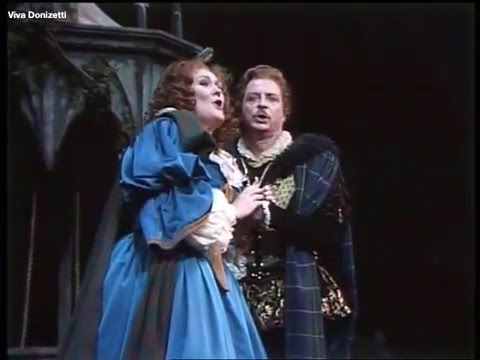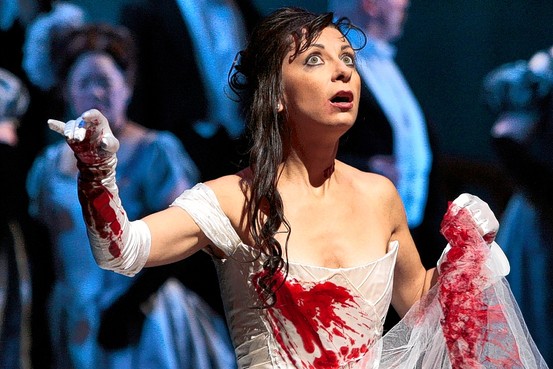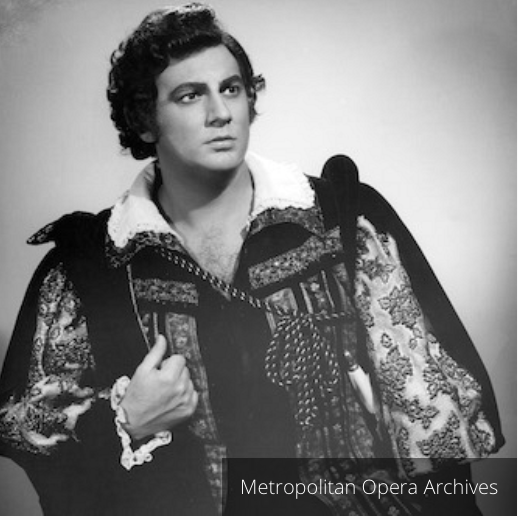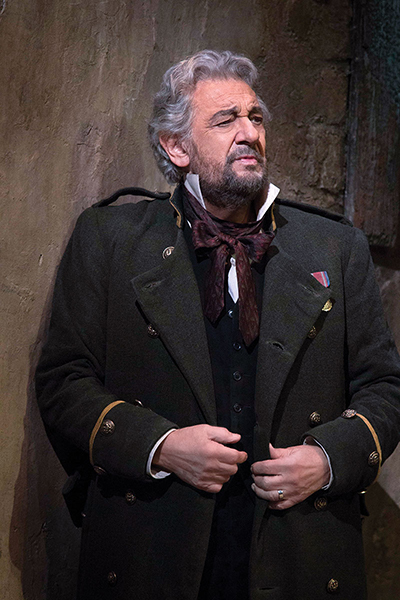|
Saturdee
Opry Links # 112: Lucia/Luisa Edition
Yes, another edition of
Saturdee Opry Links, for your infinite boredom and raising of the question, "Why
does he do this?" Today features an array of hardcore opera stuff from
Donizetti's "Lucia di Lammermoor" and Verdi's "Luisa Miller." Yes, it's a
Luisa/Lucia special! Plus overture (with nifty pantomime sequence.) Bloogarooga.
 
Alfredo Kraus and Joan Sutherland
Natalie Dessay
Saturdee Opry Links
Overture
"Don Pasquale," by Donizetti. (Fun performance, with some pantomime.)
https://www.youtube.com/watch?v=-DJ8nHIod5o
1.
Jose Carreras does not show up often enough in SOL, let alone live on stage. To
make up for that a bit, here is a spectacular example of Carreras in his prime,
with the rousing cabaletta, "L'ara o l'avella apprestami," from Verdi's "Luisa
Miller." Good morning.
https://www.youtube.com/watch?v=OE1rdRSJpMc
Setting: the gardens in the castle of Count Walter, the Tyrol, early 17th
century
Synopsis: Rodolfo has received a letter from Luisa saying that she never loved
him. He is crushed and when he goes to his father with the story, he says that
he should get his revenge by marrying the Duchess of Ostheim. Hearing this,
Rodolfo loses all hope and sings that he cannot have happiness in life or death.
Translation:
https://www.opera-arias.com/verdi/luisa-miller/l%27ara-per-l%27avello-apprest-ami/
2.
Operas tend to have exotic or poetic titles, such as "The Elixir of Love" and
"The Force of Destiny." Even the "name" operas conjure exotica and myth:
"Tristan und Isolde," "Carmen," "Salome," "Luisa Miller." What? Huh? "Luisa
Miller?" Sounds like my next-door neighbor. Hell, why not just call it "Mary
Smith?" But that is the name of a good opera by Verdi, one which anticipated his
great middle period ("Il Trovatore," "Rigoletto," "La Traviata.") (To be fair,
there is also an opera simply named "Louise," by Charpentier.) But there is one
moment in "Luisa Miller" that is decidedly exotic, without peer in all of opera:
the a cappella (unaccompanied) quartet in act two: "Presentarti alla
Duchessa." Correct: unaccompanied---an apparent compromise idea between Verdi
and his librettist. Although NO ONE KNOWS why Verdi opted for this---really. (I
have that on authority.) So this is a real freak item, this quartet for Luisa,
Federica, Walter, and Wurm---in which they essentially discuss Luisa's difficult
love life, and the various motivations and machinations that will eventually
lead to her and her lover's demise from poison. Got it? Doesn't matter
much---it's the music that counts. And why is an a cappella segment
interesting, in addition to being an oddity? The four singers are very exposed,
and must hit their notes without any orchestra. When the orchestra comes in
towards the end of the quartet, any differences in pitch would be ugly. So
there. Cast: Luisa - Ermonela Jaho; Federica - Mariana Carnovali; Wurm - Alexey
Tikhomirov; Walter - Riccardo Zanellato.
https://www.youtube.com/watch?v=KCB2qZvT3Xg
Translation:
(Search for "introduce yourself to the duchess")
https://www.opera-arias.com/verdi/luisa-miller/libretto/english/
3.

Tenor Placido Domingo inn "Miller, " 1971.
Now here is a bang-up great aria, period full stop. Real vintage Verdi vavoom.
Again, from "Luisa Miller," here is "Quando le sere al placido," sung
magnificently by then-tenor Placido Domingo, on stage in 1979. "When in the
evenings, in the calm. . ." (And if this item impresses you, wait until you see
# 4!)
Setting: the gardens in the castle of Count Walter, the Tyrol, early 17th
century
Synopsis: Rodolfo has received a (forged) letter from Luisa saying that she
never loved him. He is crushed and reminisces about the happy times they had
together.
Translation:
https://medicine-opera.com/2018/04/quando-le-sere-al-placido/
https://www.youtube.com/watch?v=qd7y9T4jcTo
4.

Baritone Placido Domingo in "Miller," 2018
And here is Placido Domingo, baritone, an incredible 39 years later (see
post # 3), also in "Luisa Miller," but playing Luisa's father, instead of her
lover, Rodolfo. Be amazed. With Sonya Yoncheva, this is "Figlia compreso d'orror,"
("Daughter, I am horrified.") A glorious duet that exemplifies archetypal great
opera. Miller sings of his anguish at his daughter's attempted suicide over
having been the victim of a plot to destroy her love affair. With English
subtitles.
https://www.youtube.com/watch?v=oYh4YlTdjxg
Translation:
https://www.opera-arias.com/verdi/luisa-miller/figlia-compreso-d%27orror/
SOL EXTRA! INTERVIEW: Domingo and Yoncheva
https://www.youtube.com/watch?v=9aG4RknK7FQ
5.
The more one listens to "Luisa Miller," the more its many arias grow on you.
Here is an unassuming little turn, "Tu Puniscimi," ("You punish me, O Lord")
with Sonya Yoncheva---just a very typical expository Verdi item. Opera is full
of such "functional," plot advancing arias that do not grab the attention in the
way the "great arias" do. Yet you can hear the the anxiety in the insistent
strings, even though they are essentially a waltz(!)---and in Luisa's
declamations, even though they are essentially melodic. Melodiousness is not
sacrificed, but rather utilized, in illustrating the drama of the moment---a
characteristic of bel canto (beautiful singing) opera. A few years after
this, toward the late 19th century, a new style of opera would come along,
verismo, in which the writing would more directly express the feelings of
the characters. (With English subtitles.)
Setting: a room in Miller's cottage, the Tyrol, early 17th century
Synopsis: Luisa's father has been taken to jail and is threatened with execution
because Luisa and Rodolfo, the Count's son, are in love. Wurm, the Count's
secretary, tells Luisa the only way to save her father is to write a letter
saying that she loves Wurm and that she never loved Rodolfo. She writes it and
then sings that, if she does wrong in writing this letter, she wishes God to
punish her instead of Wurm and the Count.
https://www.youtube.com/watch?v=J8pCR5ydsWE
Translation:
https://www.opera-arias.com/verdi/luisa-miller/tu-puniscimi-o-signore/
6.
Donizetti wrote something like 65 operas, which I know I've pointed out before,
but it always astonishes me. Sixty-five! (And he didn't even live that long.) He
was a bottomless well of melodies. A predecessor of Verdi and foremost exponent
of bel canto (beautiful singing) opera, along with Rossini and Bellini,
his masterpiece is probably "Lucia di Lammermoor" (1835.) More like one long
string of wonderful arias than an opera, "Lucia" is famous for the namesake
character going insane after being the victim of a plot to destroy her love
affair. (Lot of this going around in opera.) The climactic "mad scene" is
considered, rightfully, to be one of the most original and compelling moments in
the repertory. Yet after Lucia loses her mind and dies, there is more. Perhaps
most composers would have ended the proceedings there, but Donizetti had not yet
given his tenor that one defining moment. I have no idea if this was his sole
motivation in writing a final scene after Lucia's death, but given the quality
of the aria, it stands to reason. Found this clip of the great Carlo Bergonzi
singing "Tu che a Dio spiegasti l'ali" ("You who have spread your wings to
God"), the aria from the final scene in "Lucia." Notice that he is not
over-the-top, as many a tenor is in this sequence, but favors restraint and
lyricism. This supports the beauty of the line, and enhances the power of the
big notes.
Setting: The Ravenswood cemetary
Synopsis: After learning that Lucia has died, Edgardo is grief-stricken and
sings to Lucia that he will soon be with her in heaven. Soon afterwards, he
stabs himself and dies beside her body.
https://www.youtube.com/watch?v=LrvEnEjyIu0
Translation:
http://www.aria-database.com/search.php?individualAria=169
7.
So here is the other splendid tenor aria from Donzetti's "Lucia di Lammermoor,"
and it is notable for its legato (smooth line) lyricism---enhanced by, in this
case, the art and restraint of the singer, the great Alfredo Kraus (late in his
career.) No hamming here, just the music, ma'am. This is "Fra Poco a me recovero,"
from act two, in which Edgardo learns of the (forged) letter in which Lucia
denounces him and claims to have taken a new lover. This tender aria of despair
begins at the 4:00 mark. ("Soon this neglected tomb will give me refuge. . .")
https://youtu.be/RuG3wP_WZuA
Translation (search for "fra poco"):
https://www.opera-arias.com/donizetti/lucia-di-lammermoor/fra-poco-a-me-ricovero/
SOL EXTRA: About Alfredo Kraus, who was born
in the Canary Islands to a Spanish mother and Austrian father.
https://en.wikipedia.org/wiki/Alfredo_Kraus
8.
Now, I usually endeavor to keep things "light and bright" (or at least brief and
punchy) on SOL, but now and again I must accede to longer and heavier excerpts.
Which is to introduce the "mad scene" from Donizetti's "Lucia di Lammermoor,"
one of the most compelling moments in bel canto opera, and a tour-de-force
sequence for any soprano. Talk to one afterward, and you are likely to find her
exhausted, physically and emotionally. In other words, it ain't easy, and calls
into play many vocal tools necessary for the flights of ornamented notes native
to bel canto singing. Well worth watching! Here, Lucia---having been the victim
of a plot to separate her from her lover, Edgardo---has just been married off to
Arturo. Not given to stability from the get-go, Lucia solves the problem the
most direct way possible: by murdering Arturo in their bed, immediately after
their wedding. She emerges, covered with blood, to revelers still celebrating
her wedding, and holds forth with varying degrees of incoherence, grief. This is
the great Joan Sutherland, who essentially made her career on this role. Note
the interplay between soprano and flute, starting around the ten-minute mark, to
convey a cracked mind. Revolutionary in its time.
Setting: The hall of Lammermoor Castle
Synopsis: After killing Arturo, Lucia begins the "Mad Scene" by switching back
and forth between joy and horror. In addition to hallucinating that Edgardo is
in the room with her, she also sees the ghost that foretold the bloody end of
her romance with Edgardo.
https://www.youtube.com/watch?v=U3_8wz_xNI0
Translation:
http://www.aria-database.com/search.php?individualAria=166
And here is a terrific performance of the same, with Natalie Dessay, whose
career was cut short a couple years later by vocal cord polyps. What is very
strange about this is that it does not feature the interplay between soprano and
flute, and leaves the flights of "crazy notes" entirely to Dessay.
https://www.youtube.com/watch?v=C1LC6BRJQiQ
9.
The "other great moment" from Donizetti's "Lucia di Lammermoor" is a landmark in
operatic literature: the act two sextet. Listen as the gorgeous voices weave in
and out of one another, while the chorus and orchestra surge below. It's a
creation such as this that, were it not for the centuries of horrors committed
by humans, might almost restore one's optimism. Almost, but not quite. In any
event, here it is. "Chi mi frena in tal momento," or "Who stops me at such a
moment?" Grand opera, truly.
From an analysis of the scene:
The sextet opens with a duet between Edgardo and Enrico, in which Edgardo
expresses pity and enduring love for Lucia, and Enrico expresses remorse for his
treachery. The menís closely linked vocal lines show how, for the first time,
these two enemies are united in compassion. Lucia then takes up the melody,
shadowed by the chaplain Raimondo. Lucia is too unhappy even to weep; Raimondo
fears an evil end to the day, and pities her. Meanwhile, Edgardo and Enrico
reiterate their feelings in short asides. The sextet grows richer in texture and
the range of emotions expand as we discover each characterís reaction.
Full article about the sextet:
https://www.roh.org.uk/news/lucia-di-lammermoor-musical-highlight-the-act-ii-sextet-and-finale
Translation:
https://www.opera-arias.com/donizetti/lucia-di-lammermoor/chi-mi-frena-in-tal-momento/
https://www.youtube.com/watch?v=TR1zzv9zIO8
FINAL BOW:
Back to Verdi's "Luisa Miller," specifically one of those great, inimitably
noble-sounding Verdi arias for baritone. This is the great Sherril Milnes. Yes,
I know I say "the great" a lot, but, hell, they are. This sung by Luisa's father
to Wurm, who is hatching a plot to force Luisa to marry him. (Is there a better
name for an evil character than "Wurm?")
https://www.youtube.com/watch?v=u8npJS0wGPg
Setting: a happy village in the Tyrol, early 17th century
Synopsis: Wurm, the Count's secretary, has come to Luisa's father, a retired
soldier, to ask for his daughter's hand in marriage. Miller knows that Luisa is
in love with Carlo, and tells Wurm that he cannot force her to marry anyone as
long as she is in love with Carlo. (Famous last words.) Wurm tells him that
Carlo is actually Rodolfo, Walter's son, and leaves. Shocked, Miller comments on
how his own suspicions have come true.
Approximate translation:
https://www.opera-arias.com/verdi/luisa-miller/ah-fu-giusto-il-mio-sospetto/
And he broke my heart!
a few moments remain silent, as oppressed by pain
Ah! my suspicion was right!
Wrath and pain invades my chest!
Of all good the most holy,
without stain I want honor.
Don Solanto of a daughter,
Heaven made me, and I pay,
but the daughter, but your gift
intact to the parent.
Back to Opera Links
Back to Home Page
|



